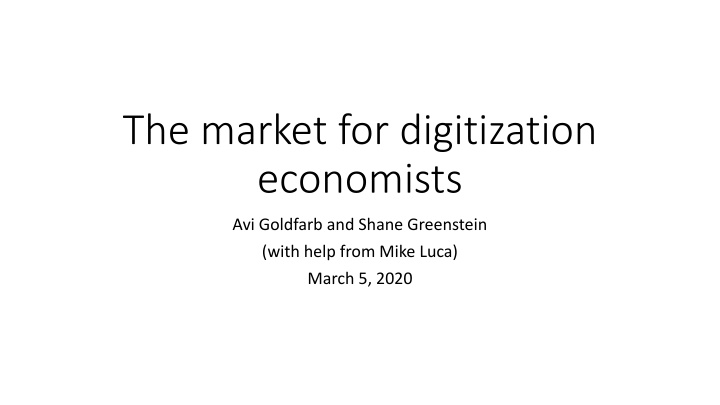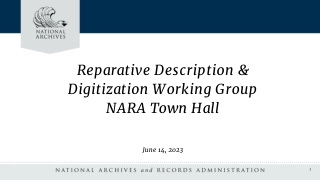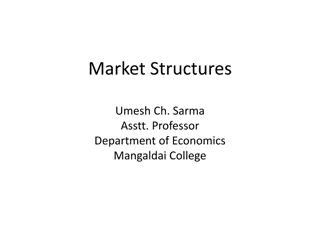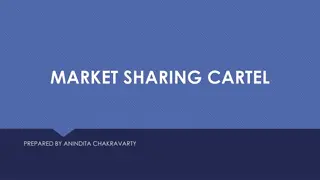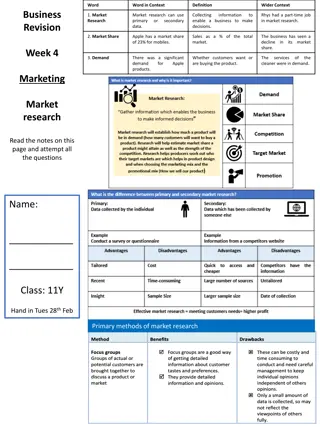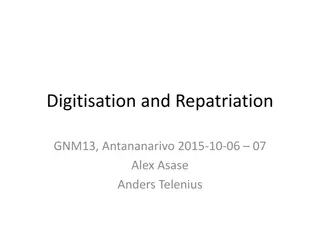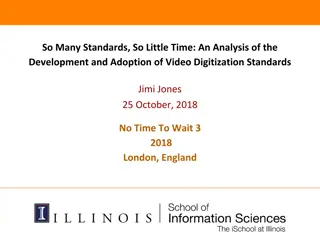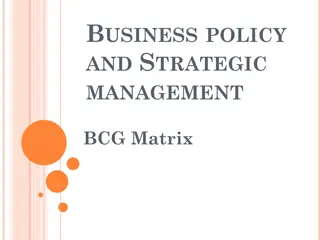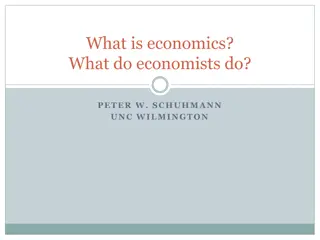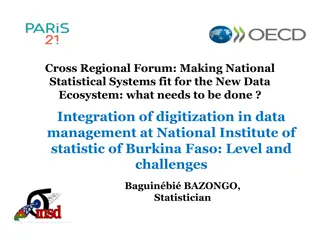The Digitization Economists Market
The market for digitization economists spans across various sectors such as Economics, Business School, Strategy, Information Systems, Entrepreneurship, and more, showcasing the diverse career paths individuals in this field have pursued. Examples of professionals and their positions in different institutions are provided, indicating the wide-ranging opportunities available within this domain. Additionally, insights into past outcomes of PhD camp students in the digitization field highlight the diverse range of organizations they have contributed to, including consulting firms, non-profits, government agencies, digital companies, and academic institutions worldwide.
Download Presentation

Please find below an Image/Link to download the presentation.
The content on the website is provided AS IS for your information and personal use only. It may not be sold, licensed, or shared on other websites without obtaining consent from the author.If you encounter any issues during the download, it is possible that the publisher has removed the file from their server.
You are allowed to download the files provided on this website for personal or commercial use, subject to the condition that they are used lawfully. All files are the property of their respective owners.
The content on the website is provided AS IS for your information and personal use only. It may not be sold, licensed, or shared on other websites without obtaining consent from the author.
E N D
Presentation Transcript
The market for digitization economists Avi Goldfarb and Shane Greenstein (with help from Mike Luca) March 5, 2020
Types of jobs Economics department Business School Business economics Strategy Information systems Entrepreneurship Operations Policy school Government Private sector Also some have landed in Library, Public Health, Medicine, Engineering, etc.
Some examples (from this conference) Person Position Employer Person Position Employer Avi Goldfarb B. school-Marketing Toronto Maryam Saeedi B. school-Economics CMU Shane Greenstein B. school-Tech. & Operations Harvard Glen Weyl Office of Chief Tech Officer Microsoft Joel Waldfogel B. school-Strategy and Econ. Minnesota Chiara Farronato B. school-Tech. & Operations Harvard Mike Luca B. school-Negotns & Organzns Harvard Mohammad S. Rahman B school-Information Systems Purdue Susan Athey B. school-Economics Stanford Mohammed Alyakoob, B school-Data science USC Dina Mayzlin B. school-Marketing USC Cl mentine Van Effenterr Economics dept Toronto Alberto Cavallo B. School-Govt and internatl Harvard Zach Brown Economics dept Michigan Judy Chevalier B. school-Economics Yale Hal Varian Private sector Google Emilio Calvano Economics dept Bologna Jorg Claussen B. school-Strategy Munich Peter Rossi B. school-Marketing UCLA Alexander MacKay B. school-Strategy Harvard Pai-Ling Yin B. school-Entrepreneurship USC Dave Godes B. school-Marketing Maryland Pinar Yildarim B. school-Marketing Penn Amalia Miller Economics dept. Virginia David Yang Economics dept Harvard
Some more examples (past years) Person Position Employer Person Position Employer Sam Ransbotham B. School-Information systems Boston Col. Rahul Telang Policy school-Info. systems CMU Frank Nagle B. school-Strategy USC Rachel Soloveichik Government BEA Lorin Hitt B. School-Information systems Penn Peter Newberry Economics dept. Penn State Justin Rao Private sector Microsoft Kevin Williams B. school-Economics Yale Catherine Tucker B. school-Marketing MIT Sonny Tambe B. School-Info. systems NYU Dean Eckles B. school-Marketing MIT Chris Forman B. School- Strategy and IS Cornell Shai Bernstein B. school-Finance Stanford Nan Li B. school-Accounting Toronto Pat Bajari Private sector Amazon Mo Xiao B. school-Economics Arizona Greg Lewis Private sector Microsoft Chris Nosko Private sector Amazon Ryan McDevitt B. school-Economics Duke Sridhar Narayannan B. school-Marketing Stanford Gordon Burtch B. school-Information systems Minnesota John Barrios B. school-Accounting Chicago Mike Smith Policy school-Info. systems CMU Jonathan Timmis NGO OECD Heidi Williams Economics dept MIT Yael Hochberg B. school-Finance Rice U
Past digitization PhD camp student outcomes Field Schools Economics Toulouse, Singapore Management U, Shanghai U Science & Tech., NUS, Strategy UBC, Minnesota, Arizona, Columbia, Harvard, Frankfurt, Cornell, BU, Temple, Penn, Ohio Consultant TGG, Analysis Group, Edgeworth, Cornerstone, Citadel Non profit/government Sloan, CDL, US CEA, IMF Digital firm Amazon, Facebook, Uber, LinkedIn, Lyft, Houzz, Pandora, Google Operations Indiana, USC Information systems U Washington, Boston College, USC, Dallas, Arizona Marketing Rochester, SMU, Berkeley, Toronto, Wash U, Harvard, UNSW, Columbia, BU, Nanyang, Kellogg, Policy Chicago Organizations Berkeley Medical School/public health Cornell (medical informatics), UIC,
Resources Economics of digitization website: bit.ly/econdigitization List of program activities Hackpad reading list Data Sources Course syllabi Wikipedia page Facebook group
General advice Search widely. This research area is applicable to an unusually large number of opportunities. Examine the reading lists on the digitization home page to decide what you d be willing to teach. Show interest in the job. Don t make it seem like they are a consolation prize. Credible signals are best: e.g. skim the basic textbook before the interview (or at least the flyout). Use the reading lists to have a clear vision of what it takes to teach a course in the topic. Some schools may want to hire you explicitly in order to teach economics of digitization as it applies to marketing/strategy/IS/.... Some practice teaching can help too. Or some TAship in an MBA classroom. Show interest in the research and activities of the people who are interviewing you. Look them up and try to find common areas of interest. Don t be shy about being an economist though. You have a particular perspective that can contribute to the broader research area of marketing, strategy, policy, etc. Lots of schools have new data analytics programs. They need economists to teach data-driven decision- making.
Digitization economists in economics depts. Used to be very rare. No longer. Usually digitization as applied in a particular established field: IO (e.g. Imke Reimers, Brad Larsen, Matt Gentzkow, etc.) Labor/health (e.g. Amalia Miller) Macro (e.g. Pascual Restrepo) Political economy (e.g. David Yang)
Prep for marketing Marketing is split between quant , behavioral , and strategy . Most research-oriented groups have mainly quant and behavioral. About half of the quants are economists (the rest are statisticians and computer scientists). Schools that have hired economists include Minnesota, UCLA, Penn, Harvard, MIT, Duke, USC, McGill, etc., and especially Chicago, Northwestern, Berkeley, Stanford, Rochester, Yale, and Toronto. The main job market is early. Applications are due July 1, flyouts in the fall, offers before Thanksgiving. Some schools also hire on the econ market, but it is a thinner group. Key journals of relevance to economists are Marketing Science, Management Science (marketing section), Quantitative Marketing and Economics, (to a lesser extent) Journal of Marketing Research You should skim through a Marketing Science or QME before your interview. You will find the methods largely familiar (and perhaps some of the papers too from NBER Digitization or IO) Econ. PhDs have had substantial success, and can continue to publish in economics. Most econ. PhDs with tenure at top schools have at least one top 5 econ publication and also publications in Marketing Science and/or QME. The traditional textbook is Kotler s Marketing Management. It isn t too informative about the research, but it does give the basic language for teaching of 3 C s and 4 P s .
Prep for information systems IS includes economists, behavioral types (psychology, sociology, and communications), and computer scientists. Many research- oriented groups have several economics types. Schools that have hired economists include Minnesota, McGill, NYU, Georgia Tech, Cornell, Irvine, Rochester, Purdue, Penn, Boston College, etc.. The main job market is largely simultaneous with economics, with the main meeting in early December ( WISE / ICIS ) Many business schools do not have an IS department. Even those that hire in IS often have IS as part of Operations Management. Key journals of relevance to economists are Management Science (information systems section), Information Systems Research, and MISQ You should skim through a Management Science for IS articles before your interview. You will find the methods largely familiar as identification- focused empirics motivated by theory. Chris Forman is currently editor for IS at Management Science. Gallaugher s Information Systems: A Manager s Guide to Harnessing Technology will give you a taste of some of the key ideas.
Prep for strategy Strategy is generally split between economics, sociology, and traditional strategy. Research-oriented groups could focus on one, two, or all three. Schools that have hired economists include Toronto, Minnesota, Harvard, MIT, USC, Northwestern, etc. The main job market is simultaneous with economics, but there is an August meeting that most job market candidates attend and have informal conversations with hiring schools. There is no clear centralized interview conference. Instead, it is often direct from application to flyout. Some schools also hire on the econ market, but it is a thinner group. There is a PhD student conference for those interested in technology called the CCC that is a useful lever to get in the door. Key journal of relevance to economists are Management Science (business strategy section and technology and entrepreneurship section), also Strategic Management Journal and (to a lesser extent) Journal of Economics and Management Strategy. For technology strategy, other journals include Research Policy and Industrial and Corporate Change You should skim through a Management Science for strategy and technology articles before your interview. You will find the methods largely familiar as identification- focused empirics motivated by theory. Econ. PhDs have had substantial success, and some continue to publish in economics (especially in the technology strategy world). The NBER Innovation group contains many economists with strategy appointments. You should (at least!) be familiar with Porter s Five Forces and the idea of competitive advantage as well as Christensen on Disruption. Shane any additions?
Prep for private sector and government This is a very broad space with a wide variety of possible roles. Research vs strategy/policy/management. Government: Central bank, Census, BLS, BEA, Regulator (FTC, DoJ, CFPB, FCC, European Commission, etc.), etc. US and International. Private sector: Digital company (Amazon, Ebay, Google, Facebook, Pandora, Netflix, etc.), financial services, economic consulting, etc. More from Mike Luca in a few minutes
List of related conferences NBER Summer Digitization Meetings NBER Winter Digitization Meetings Workshop on Information Systems and Economics (WISE) ZEW Conference on the Economics of Information and Communication Technologies IDEI-TSE-IAST Conference on the Economics of Intellectual Property, Software, and the Internet Searle Conference on Internet Search and Innovation NET Institute Workshop on the Economics of Information Security Conference on Health Information Technology and Analytics (CHITA) Statistical Challenges in Ecommerce Research (SCECR) National Association of Business Economists (NABE-TEC) Various Big Data and Digital one-off conferences in marketing, strategy, IS, economics, etc. Also friendly to digitization: CCC, DRUID, SMS, IIOC, EARIE, TPRC, Marketing Science, QME.
Prep for other academic positions Policy, Library, Public health, Medicine, etc. Groups are idiosyncratic. Know the school (especially if you get an interview). Identify the key researchers. Identify the journal(s) they publish in (in and out of economics). Try to (quickly!) skim the relevant first year course material.
Advice for advisors If possible, separate letters for econ. departments and other places. The letters should not say any econ. department outside the top 25 or any business school including the top 5. Encourage meeting with faculty in the relevant field early (or at least before the job market). If nothing else, this helps identify relevant timelines. Faculty should consider introducing students to colleagues from other specialties early and often. Though, as students, you should take initiative on this too! Support attending the relevant conferences.
Wrap-up Basic common sense: People want to know you are keen to be there. Credible signals of that keenness are useful. Still, they want your skills as an economist. Otherwise, they d hire someone from their own Ph.D. programs.
